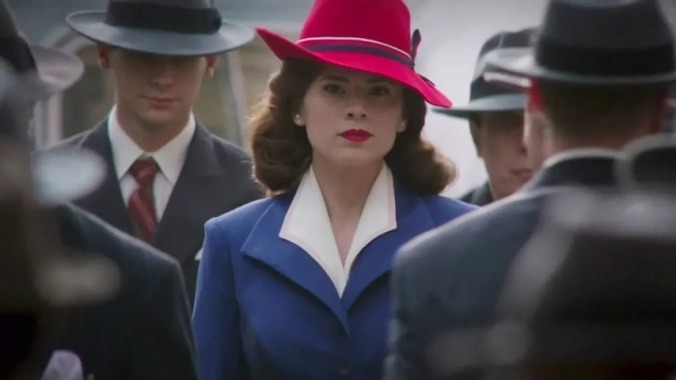It Still Stings: Agent Carter Is More Relevant Today than It Was 10 Years Ago

Margaret “Peggy” Carter (Hayley Atwell) has become something of a constant in the Marvel Cinematic Universe since her live-action debut in Captain America: The First Avenger (2011). She has made multiple appearances throughout additional projects, including the Captain America sequels and two Avengers films. Most recently, we’ve watched an alternate version of Peggy take up the shield as super soldier Captain Carter in Marvel’s animated What If…? series and a special live-action cameo in Doctor Strange in the Multiverse of Madness.
However, as enjoyable as it has been to see Captain Carter, Peggy’s most important appearance remains her short-lived series Marvel’s Agent Carter, depicting Peggy’s adventures in the late 1940s after losing Steve Rogers (Chris Evans) and returning home from war to find her role within the Strategic Scientific Reserve greatly diminished simply because she’s not a man. Though the series was unceremoniously canceled after a two-season run from 2015-16, it is arguably even more timely and poignant now, given what’s currently happening in the world and specifically in the United States. As such, it is the perfect time to bring Peggy Carter back to the small screen and continue to see how she defied the odds and made a name for herself outside of being Captain America’s girlfriend.
First and foremost, Marvel’s Agent Carter is a story of women taking ownership of and exerting control over their own lives, despite society telling them they don’t matter unless they are mothers, wives, and homemakers. As a certain political party and percentage of the populace attempt to turn back time and return the world to the darkness of the past, making their prejudices, bigotry, and “traditionalist” values the norm again, Peggy’s fight against the system and many of those same ignorant, outdated beliefs is sadly more relevant now than when the series originally premiered.
Peggy is the only female field agent in the SSR, though she’s no longer allowed to do much (or any) fieldwork. Her colleagues belittle, demean, and altogether dismiss her skills, talents, and history, making disgusting and misogynistic comments about her and the other women in their lives—excluding Daniel Sousa (Enver Gjokaj), the only man in that office worthy of respect. They task Peggy with things they don’t want to do, like answering the phones and filing papers, ignoring that her espionage and investigatory abilities far surpass their own. In short, they believe she is incapable of handling herself and that her intelligence is far inferior to their own; after all, how could Peggy Carter be a decent spy when she’s a weak, small-minded woman?
However, Peggy doesn’t waver in her determination to prove her worth. She is well aware of the value she offers to the agency and country, and is well prepared to fight her own battles, becoming angry on occasion when a man attempts to do so for her. And, as we see repeatedly, Peggy can hold her own against foes that are far stronger, bigger, and/or more skilled than herself. She doesn’t give in to the expectations thrust upon her, and she uses the ignorance and misogyny of those around her to her advantage—actually working in the shadows, as a spy should, and using their lack of belief and interest in her to achieve her goals. As she says herself, she’s practically invisible, but in some situations that’s her greatest strength.
While Peggy wages her war against sexism and misogyny in the SSR, other characters are dealing with similar issues in their own ways. Like Peggy, her nemesis Dottie Underwood (Bridget Regan), one of the many assassins to emerge from Russia’s Black Widow program, uses society’s antiquated view of women to her advantage. She’s particularly effective because those she targets cannot fathom that a woman would be capable of such brutality and deception. Whitney Frost (Wynn Everett), the antagonist in Season 2, is a movie starlet on the verge of being pushed out of the business because she’s considered too old. She’s also one of the most intelligent people on the planet but has been overlooked and ignored because, again, she’s a woman. This drives her mission to seize power—primarily from a council of rich men who use their wealth and status, such as being the owner of every newspaper on the West Coast, to influence elections and commit other atrocities, which sounds awfully familiar—and an unending lust for more. She isn’t content with the limits the world has given her.
-

-

-

-

-

-

-

-

-

-

-

-

-

-

-

-

-

-

-

-

-

-

-

-

-

-

-

-

-

-

-

-

-

-

-

-

-

-

-

-








































